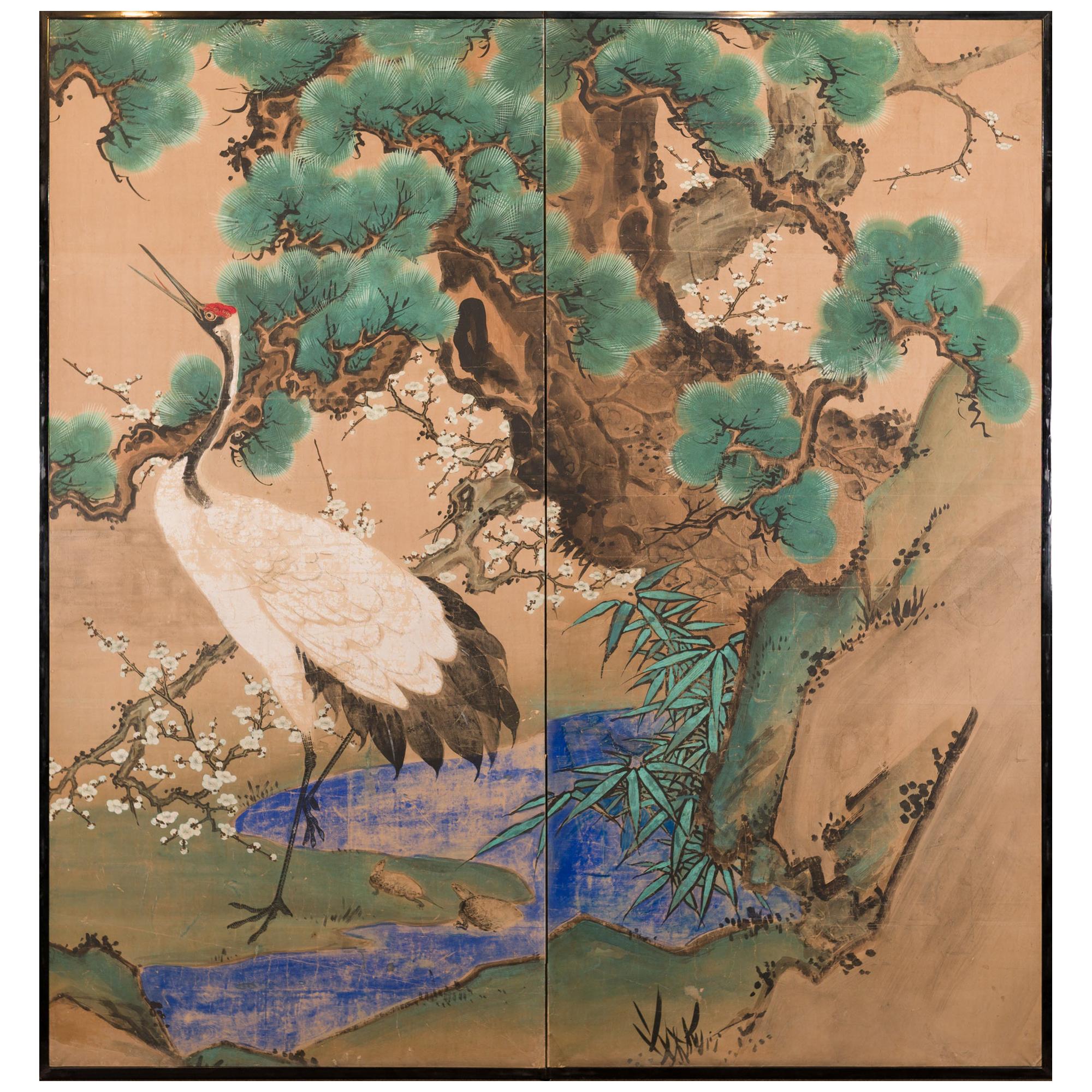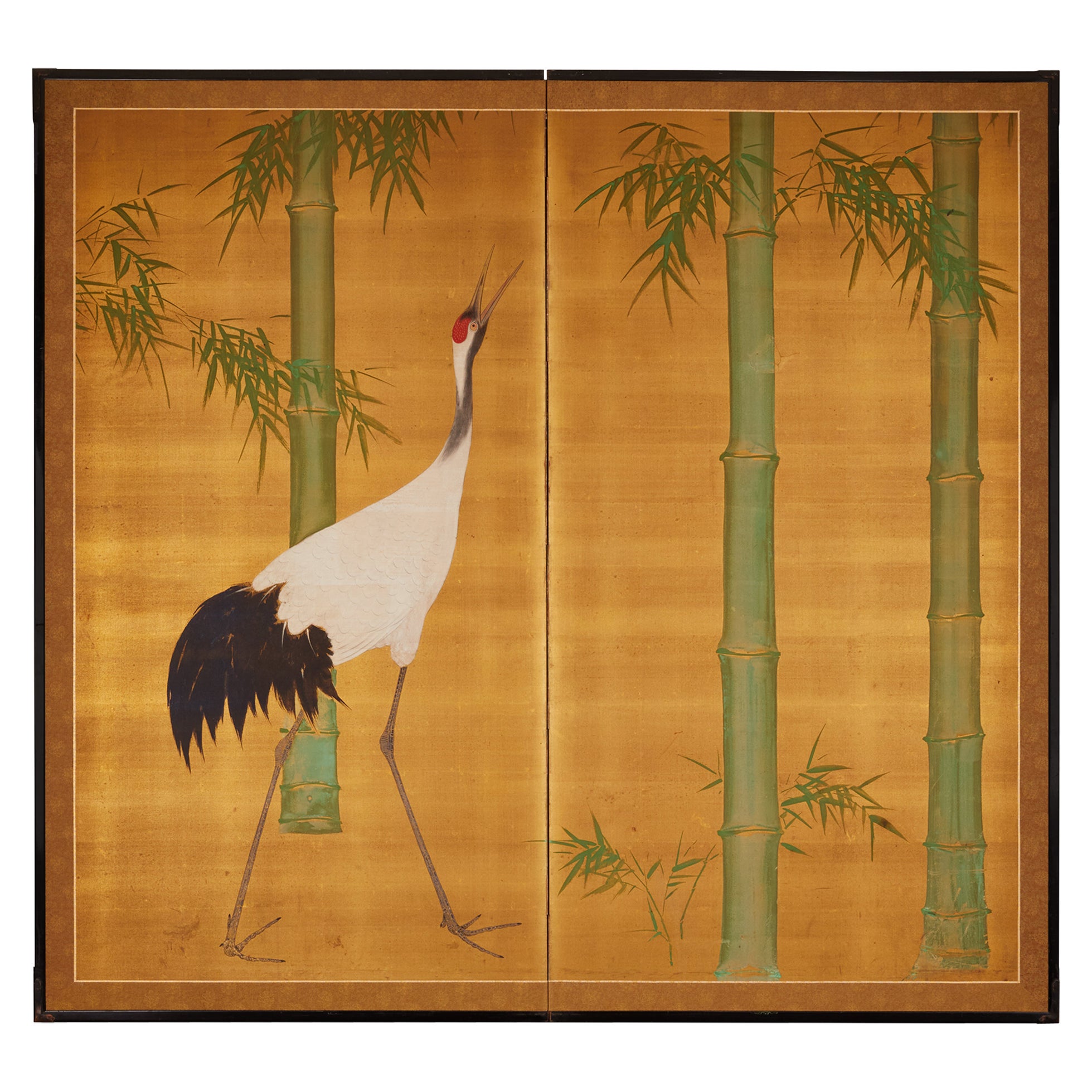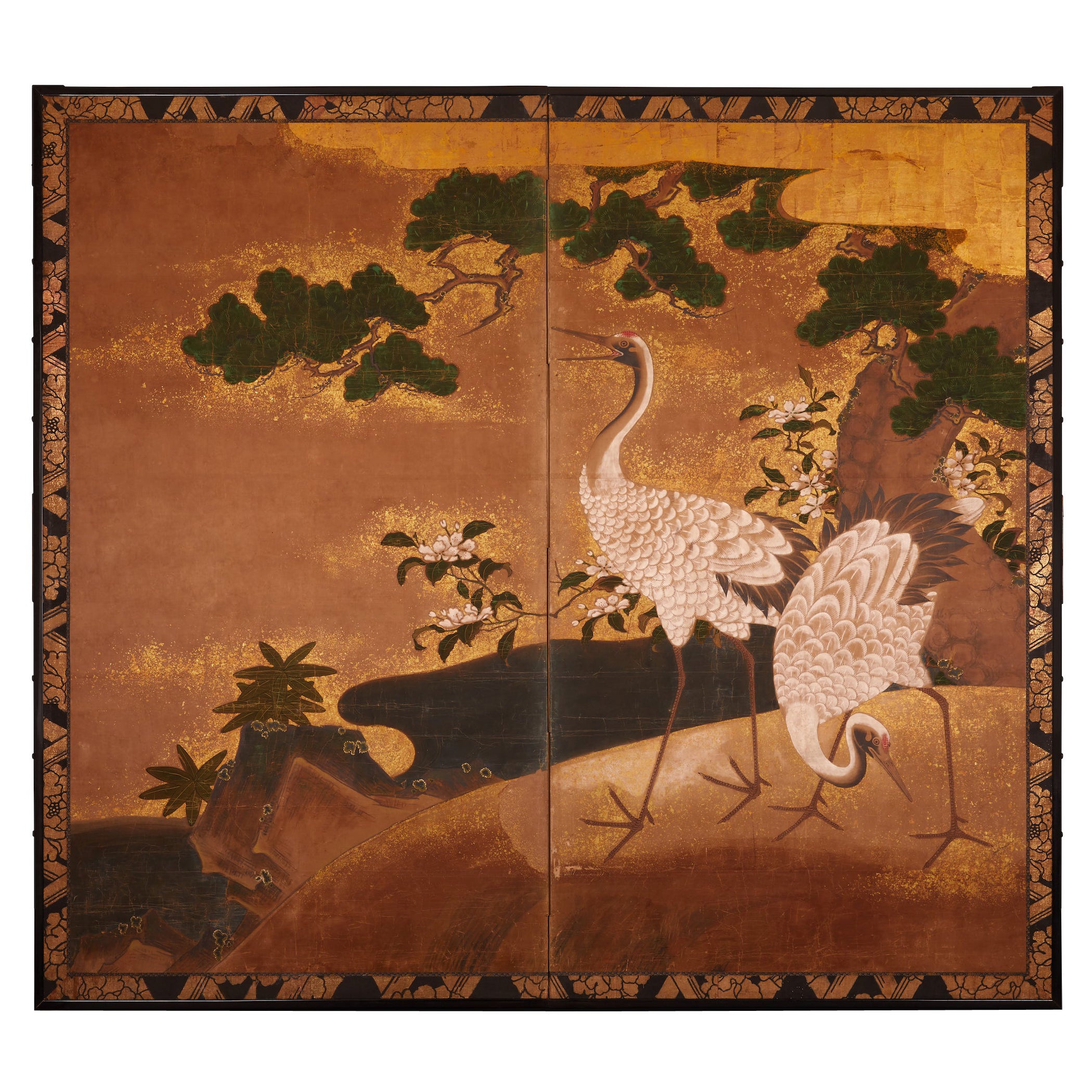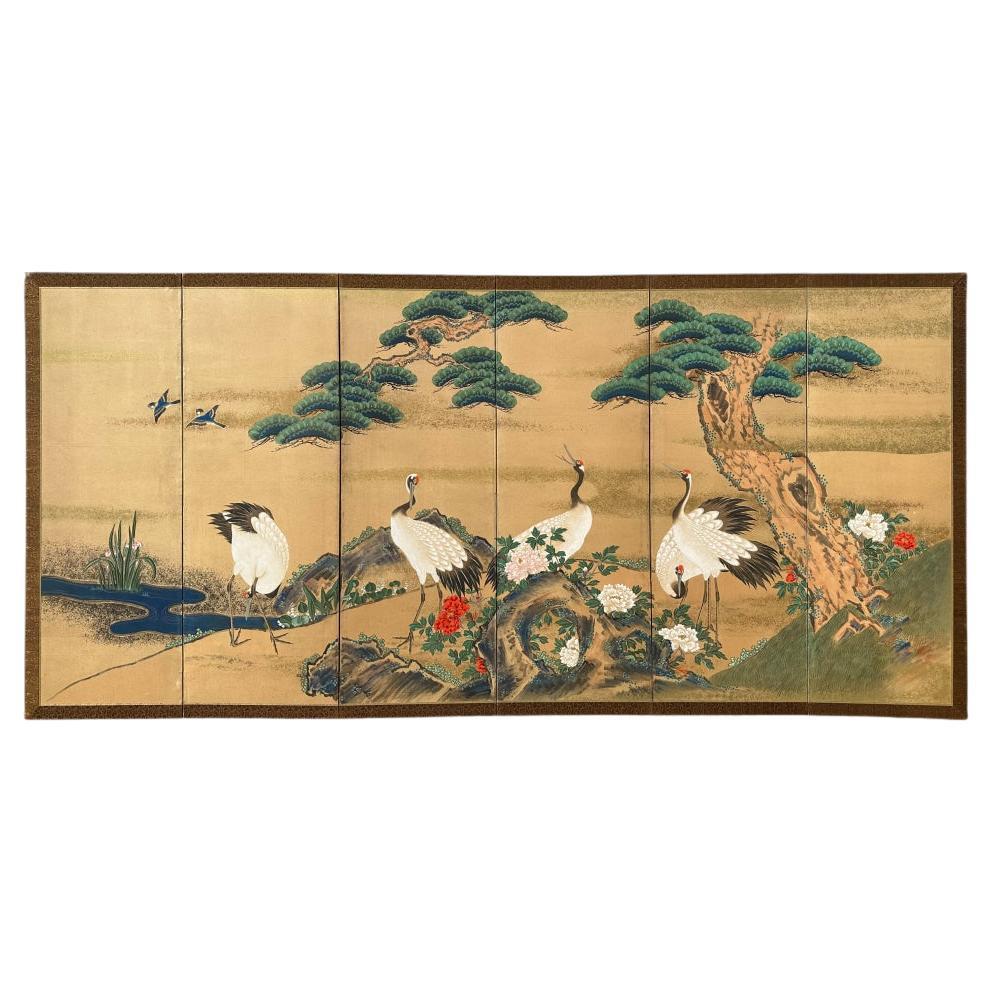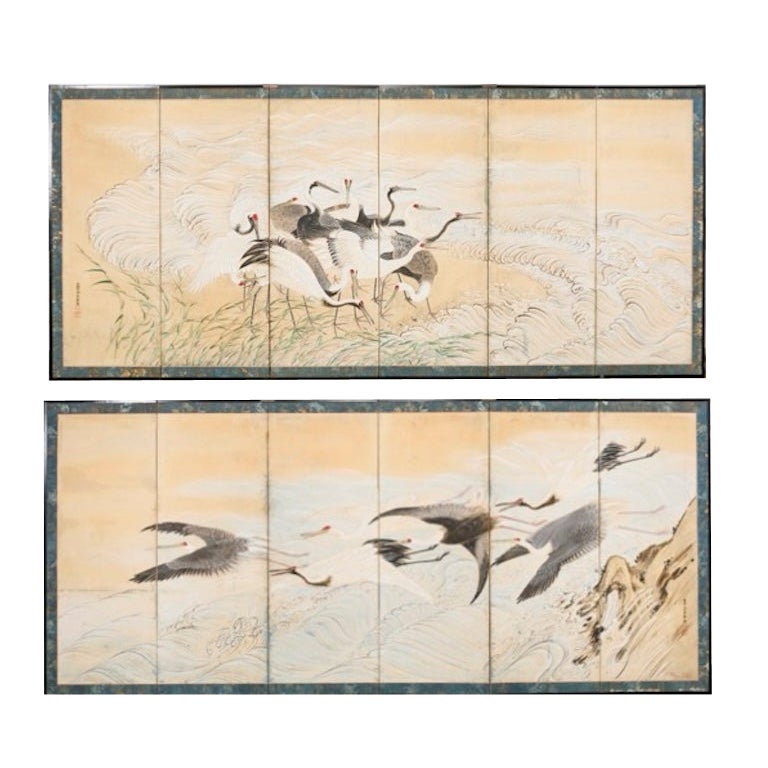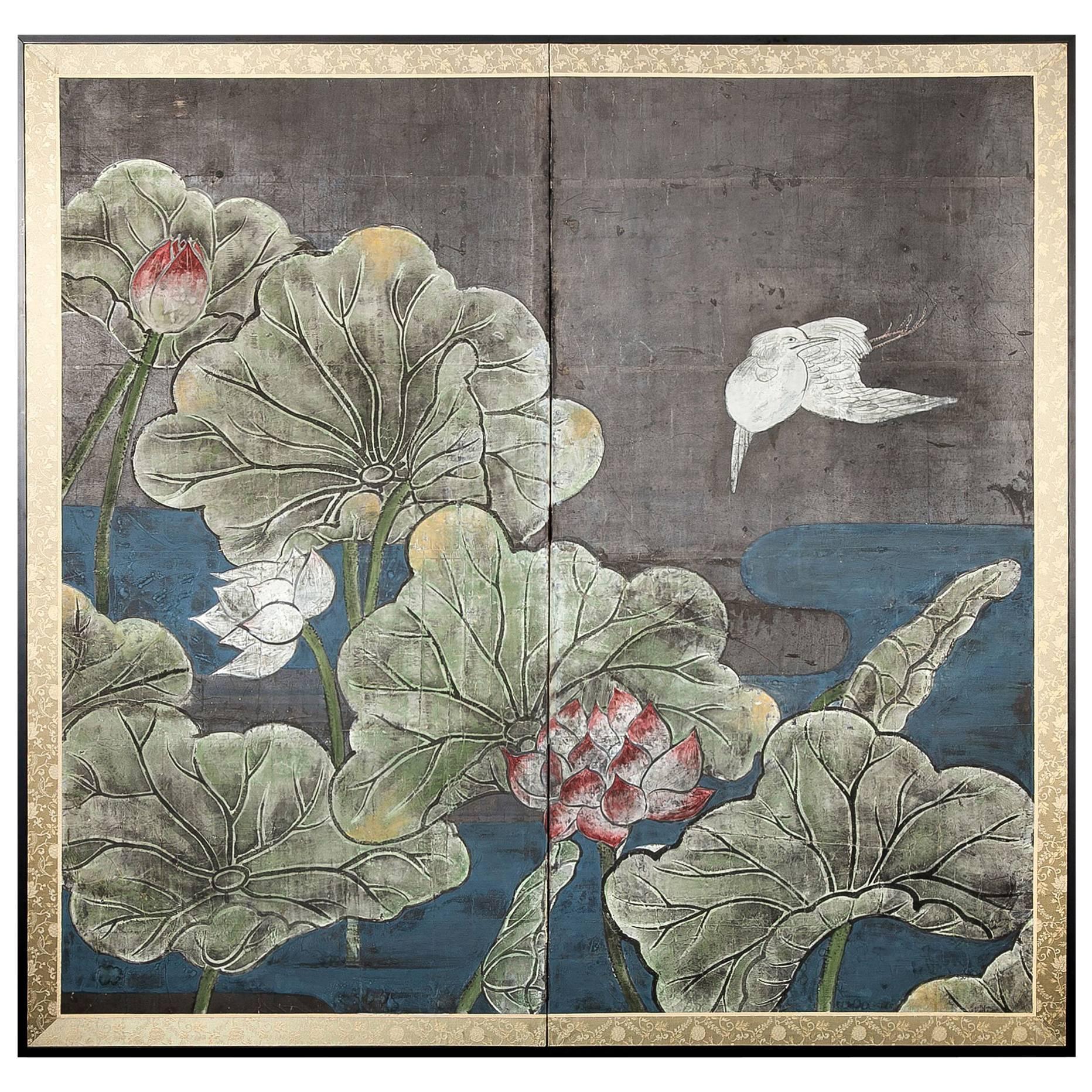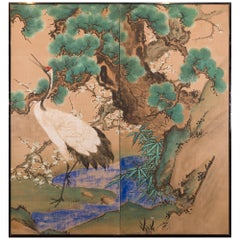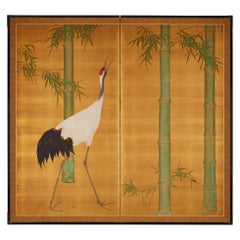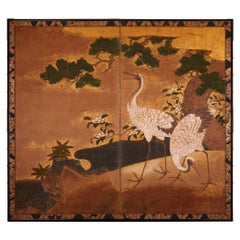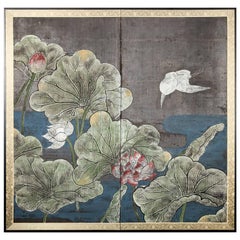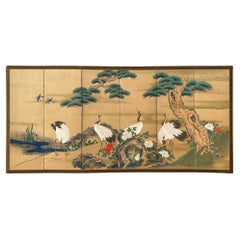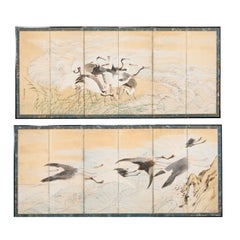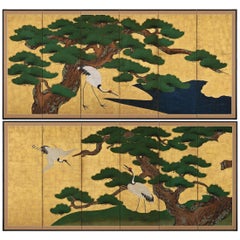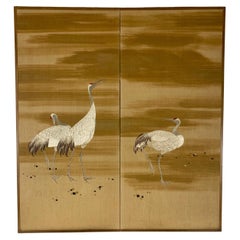Items Similar to Japanese Two Panel Screen Amorous Cranes and Turtles
Want more images or videos?
Request additional images or videos from the seller
1 of 15
Japanese Two Panel Screen Amorous Cranes and Turtles
$21,000
£15,796.41
€18,208.01
CA$29,580.83
A$32,457.21
CHF 16,986.60
MX$399,438.34
NOK 214,005.61
SEK 200,448.15
DKK 135,957.20
About the Item
Japanese two panel screen: Amorous Cranes and Turtles. In Japan, cranes symbolize fidelity as they mate for life and turtles symbolize longevity. Additionally, this screen also has the Japanese motif of sho-chiku-bai, or the three friends of winter (pine, plum, and bamboo). So called the three friends of winter because all three flourish during the cold months. This screen was originally fusuma doors for either a temple or an important household due to evidence of very large door pulls. Kano school painting in mineral pigments, including an invigorating green and blue, on mulberry paper with a black frame. One of a pair, sold separately.
- Dimensions:Height: 67 in (170.18 cm)Width: 63.25 in (160.66 cm)Depth: 0.75 in (1.91 cm)
- Style:Edo (Of the Period)
- Materials and Techniques:
- Place of Origin:
- Period:
- Date of Manufacture:circa 1850
- Condition:Most items that are 100 years old have been cleaned or polished in their lifetime. More involved restorations are mentioned in the above description. For a detailed condition report and a video of this item please contact us directly. -Naga Antiques.
- Seller Location:Hudson, NY
- Reference Number:Seller: S17441stDibs: LU855121959222
About the Seller
5.0
Recognized Seller
These prestigious sellers are industry leaders and represent the highest echelon for item quality and design.
Established in 1971
1stDibs seller since 2008
166 sales on 1stDibs
Typical response time: 8 hours
Associations
The Art and Antique Dealers League of AmericaAntiques Associations Members
- ShippingRetrieving quote...Shipping from: Craryville, NY
- Return Policy
Authenticity Guarantee
In the unlikely event there’s an issue with an item’s authenticity, contact us within 1 year for a full refund. DetailsMoney-Back Guarantee
If your item is not as described, is damaged in transit, or does not arrive, contact us within 7 days for a full refund. Details24-Hour Cancellation
You have a 24-hour grace period in which to reconsider your purchase, with no questions asked.Vetted Professional Sellers
Our world-class sellers must adhere to strict standards for service and quality, maintaining the integrity of our listings.Price-Match Guarantee
If you find that a seller listed the same item for a lower price elsewhere, we’ll match it.Trusted Global Delivery
Our best-in-class carrier network provides specialized shipping options worldwide, including custom delivery.More From This Seller
View AllJapanese Two Panel Screen Manchurian Crane and Turtles
Located in Hudson, NY
In Japan, cranes symbolize fidelity as they mate for life and turtles symbolize longevity. Additionally, this screen also has the Japanese motif of sho-chiku-bai, or the three friends of winter (pine, plum, and bamboo). So called the three friends of winter because all three flourish during the cold months. This screen was originally fusuma doors...
Category
Antique Mid-19th Century Japanese Edo Paintings and Screens
Materials
Paper
Japanese Two Panel Screen: Bamboo and Manchurian Crane
Located in Hudson, NY
Kano style painting in mineral pigments on silk with a silk brocade border.
Category
Early 20th Century Japanese Paintings and Screens
Materials
Brocade, Silk
Japanese Two-Panel Screen: Cranes on Gold
Located in Hudson, NY
Early Kano School painting of pine trees overlooking two beautifully painted cranes and floral design in a natural setting by water’s edge. Mineral pig...
Category
Antique Late 18th Century Japanese Paintings and Screens
Materials
Gold, Gold Leaf
Japanese Two Panel Screen, Lotus and Heron
Located in Hudson, NY
Japanese two panel screen, lotus and heron
Colored mineral pigments on silver leaf on handmade mulberry paper.
Category
Antique Late 19th Century Japanese Paintings and Screens
Japanese Two Panel Screen: Mandarin Ducks and Geese Among Bamboo and Flowers
Located in Hudson, NY
Japanese Two Panel Screen: Mandarin Ducks and Geese Among Bamboo and Flowers, Edo period painting (c. 1850) of mandarin ducks and geese on a grassy sh...
Category
Antique Mid-19th Century Japanese Edo Paintings and Screens
Materials
Gold
Japanese Two Panel Screen, Heron In Water Lily Pond Under Willow
Located in Hudson, NY
Japanese Screen painted with Heron In Water Lily Pond Under Willow. Meiji period (1868 - 1912) painting of a heron at pond's edge. Painted in min...
Category
Early 20th Century Japanese Meiji Paintings and Screens
Materials
Wood, Paper
You May Also Like
Serene Cranes: Late Edo Masterpiece
Located in Fukuoka, JP
Serene Cranes: Late Edo Masterpiece
Dimensions: 364x173 cm (143x68 inches)
Period: Late Edo
SKU: PTA154
Immerse yourself in a realm of timeless elegance with our latest addition—a ...
Category
Antique Mid-19th Century Japanese Edo Paintings and Screens
Materials
Wood, Paper
Pair of Japanese Meiji Six Panel Screen Cranes Above Cresting Waves
Located in Rio Vista, CA
Amazing 19th century pair of large Japanese Meiji period six panel screens each depicting a sedge of Manchurian red-crowned cranes along the shore. The screens are crafted in the Nihonga school style with intricate details and beautifully depicted cresting waves. Each screen is signed by artist Hakundo Keikan and studio name of Watahiki Tokai (Japanese 1837-1915). Both screens are signed with red seals on the left and right side. Tokai was a Chinese scholar from the late Edo period and served in the Imperial Household...
Category
Antique 19th Century Japanese Meiji Paintings and Screens
Materials
Brass
Circa 1700 Japanese Screen Pair, Cranes & Pines, Kyoto Kano School
Located in Kyoto, JP
Pines and Cranes
Anonymous. Kyoto Kano School.
Late 17th/early 18th centuries, circa 1700.
Pair of six-panel Japanese folding screens.
Ink, gofun, pigment and gold leaf on paper.
This bold composition presents two pine trees extending to the left and right across a gold leaf background. One tree is silhouetted against a green ground, golden clouds obscuring its true size, the other stretches across a stylized waterway. The pines are paired with Manchurian cranes with red crests and snow white plumage. Both have been highly auspicious motifs in East Asia since Chinese antiquity. Here the artist utilized fluid and instinctive ink brushstrokes to define the trunk, branches and tail feathers, in strong contrast to the precision and sharp angularity of the crane’s legs and beaks. The adoption of this vast metallic painting support required an unerring sense of design and composition, so that the negative space surrounding motifs could imply context for the otherwise floating pictorial elements. The brushwork detailing the trunks of the pines, the exaggerated dimensions of the pine trees and the strength and dynamism of the composition are all reminiscent of Kano Eitoku...
Category
Antique Late 17th Century Japanese Edo Paintings and Screens
Materials
Gold Leaf
Asian Folding Hand Woven Screen of Cranes
Located in Denton, TX
Asian Folding Hand Woven 2 Panel Screen of Cranes.
Category
Mid-20th Century Japanese Anglo-Japanese Tapestries
Materials
Thread
Japanese Edo Period Two-Panel Screen
Located in Stamford, CT
A Japanese Edo Period two panel folding screen with white and brown hawks of ink and color on paper.
Category
Antique Mid-19th Century Japanese Edo Paintings and Screens
Materials
Paper
Pair of Large Antique Japanese Paintings
Located in West Palm Beach, FL
A pair of large antique Japanese paintings of Cockerel and Hen with chicks among timber bamboo. Mounted in the single panel screen panel styl...
Category
Antique 1880s Paintings and Screens
Materials
Silk
More Ways To Browse
Large Door Pulls
Antique Crane
Antique Turtle
Japanese Screens Large
Japanese Wood Door
Japanese Crane
Pair Of Japanese Paintings
Asian Wood Screen Panels
Large Turtle
Japanese Screen Bamboo
Japanese Crane Art
Antique Door Pulls
Japanese Wood Temple
Japanese Art Of Cranes
Pair Of Crane
Green Japanese Screen
Japanese Door Panels
Pair Of Japanese Screens
